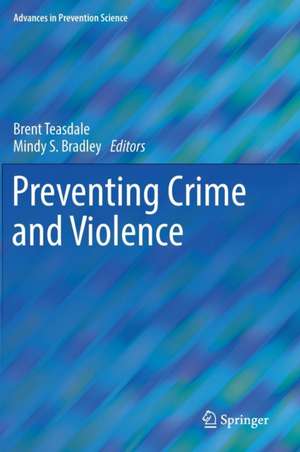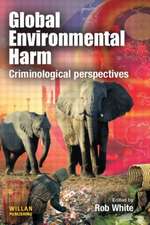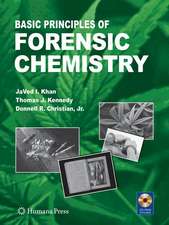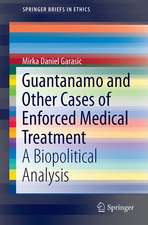Preventing Crime and Violence: Advances in Prevention Science
Editat de Brent Teasdale, Mindy S. Bradleyen Limba Engleză Hardback – 16 dec 2016
Included in the coverage:
- Integrating criminology and prevention research
- Social disorganization theory: its history and relevance to crime prevention
- Research designs in crime and violence prevention
- Macro- and micro-approaches to crime prevention and intervention programs
- Implications of life course: approaches for prevention science
- Promising avenues for prevention, including confronting sexual victimization on college campuses
| Toate formatele și edițiile | Preț | Express |
|---|---|---|
| Paperback (1) | 1117.34 lei 6-8 săpt. | |
| Springer International Publishing – 4 iul 2018 | 1117.34 lei 6-8 săpt. | |
| Hardback (1) | 1124.78 lei 6-8 săpt. | |
| Springer International Publishing – 16 dec 2016 | 1124.78 lei 6-8 săpt. |
Preț: 1124.78 lei
Preț vechi: 1371.68 lei
-18% Nou
Puncte Express: 1687
Preț estimativ în valută:
215.29€ • 233.94$ • 180.96£
215.29€ • 233.94$ • 180.96£
Carte tipărită la comandă
Livrare economică 21 aprilie-05 mai
Preluare comenzi: 021 569.72.76
Specificații
ISBN-13: 9783319441221
ISBN-10: 3319441221
Pagini: 694
Ilustrații: VII, 388 p. 7 illus.
Dimensiuni: 178 x 254 x 22 mm
Greutate: 0.9 kg
Ediția:1st ed. 2017
Editura: Springer International Publishing
Colecția Springer
Seria Advances in Prevention Science
Locul publicării:Cham, Switzerland
ISBN-10: 3319441221
Pagini: 694
Ilustrații: VII, 388 p. 7 illus.
Dimensiuni: 178 x 254 x 22 mm
Greutate: 0.9 kg
Ediția:1st ed. 2017
Editura: Springer International Publishing
Colecția Springer
Seria Advances in Prevention Science
Locul publicării:Cham, Switzerland
Cuprins
Part 1: Introduction to Criminology, Criminal Justice and Prevention.- Definition and Scope of the Problem.- Costs of Crime.- Part 2: Theoretical Foundations to Preventing Crime and Violence.- Social Learning.- Strain.- Social Control.- Self-Control.- Social Disorganization.- Routine Activities.- Implications of Theory for Preventing Crime and Violence.- Part 3: Life Course Development and Crime.- Introduction.- Pre-Natal and Infancy.- Childhood and Pre-Adolescence.- Adolescent and Early Adulthood.- Late Adulthood/Elder Abuse.- Implications of Development for Preventing Crime and Violence.- Part 4: Methodological Issues in Crime Prevention Research.- Introduction.- Research Designs.- Propensity Score Matching.- Survival Models.- Growth Mixture Models: Criminal Careers.- Spatial Regression: Hot Spots.- Poisson and Negative Binomial Models: Crime Counts.- Cost Analytic Studies.- The Importance of Methodological Designs in the Study of Crime Prevention.- Part 5: Crime Prevention Interventions: What Works?.- Targeting Crime Prevention Across Domains.- Family Focused.- Peers/School Focused.- Community Focused.- Criminal Justice System Focused.- Part 6: Integrating Theory, Method, and Intervention: Preventing Crime and Violence. New Directions.- An International Perspective on Crime Prevention.- Implications of Prevention Science for Crime and Criminal Justice Policy.
Recenzii
“This multiple author, multidisciplinary book extensively covers current theory, research design, and evidence-based primary and secondary prevention programs. … this book offers a broad and challenging look at the scope of this serious problem, as well as possible solutions that do not involve increased incarceration. … This book will be a useful reference for crime prevention scholars and for graduate students in this and related areas. … The book is comprehensive and the chapters are well written … .” (Jeanne Funk Brockmyer, PsycCRITIQUES, Vol. 62 (12), March, 2017)
Textul de pe ultima copertă
This insightful volume integrates criminological theories, prevention science, and empirical findings to create an up-to-date survey of crime prevention research and strategies. Its interdisciplinary perspective expands on our knowledge of risk factors to isolate the malleable mechanisms that produce criminal outcomes, and can therefore be targeted for intervention. In addition, the text identifies developmental, lifespan, and social areas for effective intervention. Reviews of family-, community-, and criminal justice-based crime prevention approaches not only detail a wide gamut of successful techniques, but also provide evidence for why they succeed. And as an extra research dimension, the book’s chapters on methodological issues and challenges uncover rich possibilities for the next generation of crime prevention studies.
Included in the coverage:
Integrating criminology and prevention research
Social disorganization theory: its history and relevance to crime prevention
Research designs in crime and violence prevention
Macro- and micro-approaches to crime prevention and intervention programs
Implications of life course: approaches for prevention science
Promising avenues for prevention, including confronting sexual victimization on college campuses
Spotlighting current progress and continuing evolution of the field, Preventing Crime and Violence will enhance the work of researchers, practitioners, academicians, and policymakers in public health, prevention science, criminology, and criminal justice, as well as students interested in criminology and criminal justice.
Included in the coverage:
Integrating criminology and prevention research
Social disorganization theory: its history and relevance to crime prevention
Research designs in crime and violence prevention
Macro- and micro-approaches to crime prevention and intervention programs
Implications of life course: approaches for prevention science
Promising avenues for prevention, including confronting sexual victimization on college campuses
Spotlighting current progress and continuing evolution of the field, Preventing Crime and Violence will enhance the work of researchers, practitioners, academicians, and policymakers in public health, prevention science, criminology, and criminal justice, as well as students interested in criminology and criminal justice.
Caracteristici
Integrates prevention science with theories and methods from criminology Examines crime prevention across multiple contexts: schools, peers, communities, and the criminal justice system Uses a life course/developmental approach to crime prevention Focuses on evidence-based programs and policies for preventing crime and violence Includes supplementary material: sn.pub/extras












